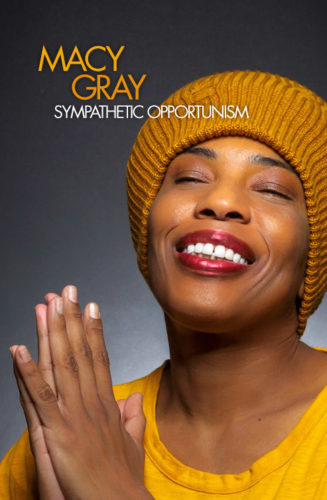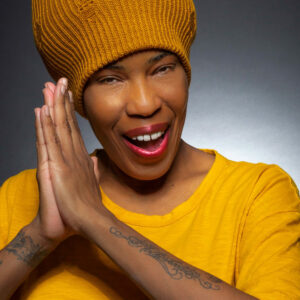
To act on an opportunity or not: a deceptively simple choice governing our everyday existence.
Weighing the consequences of a decision is admirable, but as we all know, it is action, rather than intention, that ultimately defines us within and without.
As there is often a thin line that separates an act of “appropriate self-interest” with an act of “detrimental self-centeredness”, what defines an act is the context behind making the decision, the pattern of responses to the opportunity, and how the decision is perceived by ourselves and others.
And it is here where we find ourselves at an existential crossroads. Do we follow the principle of doing what we want? Or, doing what is the right thing to do?
For all the wonderful opportunities life has thrown her way, multi-platinum recording artist and Grammy Award winner Macy Gray has also tasted the bitterness of fame. Yet, rather than playing the victim, Macy’s philosophy eschews the very notion of wallowing in the mire of the past.
By not succumbing to criticism, and alternatively focusing on being genuine and true to form, Macy has gained invaluable insight, revealing a courageous personality who continues to create inspired music.
Pulling information out of Macy was… well… as if on a tiny research vessel, struggling to tag a ginormous fish with experience in evasion. Not that she didn’t want to be observed, Macy just didn’t want to be stuffed and displayed on a trophy wall, placed into some biased juxtaposition without having a voice to express or defend herself.
And can we really blame her?
Though her answers were often curt, veiled beneath a veneer of cool, Macy’s unapologetic nature seemed to be paved with gratitude and good intentions.
As the Q&A scrimmage continued, we eventually came around to the subject of opportunism. It was here when Macy perked up, stating, “I don’t think capitalizing on opportunities makes you a bad person.”
To which I responded, “Everybody should have the opportunity to succeed, but we shouldn’t be intentionally crushing people on the way up.”
We both agreed that the goal is to remain mindful and sympathetic while capitalizing on opportunity, as prowess is no substitution for kindness. But regardless of good intentions, it’s often difficult not to let the means justify the ends… especially when paraded as a poster child for the excesses of stardom.
It’s no secret that Macy had her bouts with controversy, but as she puts it, “Unless it’s a direct attack against me, I don’t pay much attention.”
While some artists are simply looking to bask in unscrupulous fame, others fearlessly deliver their message on point sticking to principle. As for Macy, it’s the courage of the latter that she chooses to embrace, and share with the world.
It takes a nimble, yet uncompromising, mindset to sidestep the destructive nature of the ego, and gracefully traverse the moral wastelands of the entertainment business. Though she emerged as a successful singer-songwriter, musician, record producer and actress, Macy is mindful that she beat the odds.
“How do you feel about Billie Holiday?” I ask.
Macy again perks up, “She was incredible… a black woman, in New York, on stage, in the 40s, dealing with segregation? That takes guts.”
Other than being a great jazz singer and performer, Billie Holiday fell into situations that impacted her health and career. I continue the thread, “So how can we navigate the insanity of the music business without becoming a casualty?”
Macy responds, “As a performer, you want people to like what you have in your heart, and what you’re really trying to say, but people do what they have to do sometimes, doing stuff they shouldn’t be doing.”
It is here that Macy touches on an interesting point concerning self-awareness and justification.
Macy continues, “Billie was in and out of mental institutions. She probably didn’t have any support, or rehab, the way they have now. If she hadn’t died, Billie would be doing the best she could.”
Self-preservation is opportunistic; however, we should never be coerced into justifying our actions, especially when confronted with overwhelming external pressures to conform to abhorrent injustices like segregation.
In spite of the seemingly insurmountable marginalization of the 40s, the tide turned in the 70s when a surge in boldly optimistic black performers skillfully began weaving their messages of resistance and reform into their music.
Macy admits to feeling empowered by the sociopolitical climate of the 70s, a decade that offered a glimpse of opportunism at its best, and improved the perception of America on the world stage.

It is clear that Macy’s many albums have never veered off course. Ripe with unswayable integrity, her songs underscore a complex personality with a steadfast message. No fluff. No gimmicks.
Macy’s impressive career has been a long road from her debut album, On How Life Is, to her latest album, Ruby. Though her music has matured in terms of style and content, the Macy spark still remains. On this note, I ask, “What has changed in terms of your storytelling?”
Macy responds, “A lot of things have happened, and I’ve grown up a little bit. I see things differently.”
She pauses.
Then flippantly comments, “You know, I don’t really sit back and think about myself that much.”
I press on. “So you kinda just go for it… head down… horns up… and just charge.”
With an interesting mix of counterpoise and self-compassion, she replies, “I think you have to. Once you get into analyzing yourself, it’s too consuming. I got caught up in things that I couldn’t fix anymore… so I kinda moved on. I don’t enjoy trying to figure myself out.”
Looking for confirmation, I state, “So, to you, progress is moving forward. Not looking back in self-reflection.”
She responds, “Well… I’d rather look forward. Looking back can be so depressing.”
Addressing painful memories is not easy, but it is cathartic. However, maybe at some point drudging up the past eventually becomes a liability, or a crutch.
Then again, we are inescapably the culmination of our past, and the wisdom gained through previous relationships. Furthermore, the true gems were those individuals who offered support during our most vulnerable moments, believing in us when we felt alone and misunderstood.
I ask, “How has the idea of family shaped your life?”
She asserts, “It’s all about being loyal.”
Allegiance is paramount, especially when people who WANT constantly chip away our patience and sanity.
Loyalty builds over time. Wisdom, on the other hand, doesn’t always naturally come with age. I playfully needle Macy, “One of your latest songs is called ‘Buddah’… so… what wisdom have you acquired over the years?”
She sympathetically responds, “When you have kids, you make a lot of mistakes. There are all these books about punishment and discipline, but that’s not really what it’s all about. Your best bet is to be there and have their back… and be a lot more, chill.”
“Chill”, I repeat.
“Yeah I’m too old for crazy.” Macy laughs.
As with all celebrated artists, Macy may repeatedly find herself thrust into the spotlight with her actions open to criticism. Nevertheless, the way things appear can give an impression quite different from the real motivation behind it.
With an impressive career and a fulfilling family life, Macy continues to excel. She is conscious of the danger in blindly adhering to societal norms, and is wise to the prospect that healing ultimately lies within us.
In lieu of the opportunity confronting us, for reasons much greater than satisfying our personal desires, sometimes we just have to take an action that may not be immediately understood by outsiders.
Just as with Steve Zissou’s infamous “Jaugar Shark”… Macy has forgiven and released her nemesis, which has returned, transformed, to dazzle us all.




